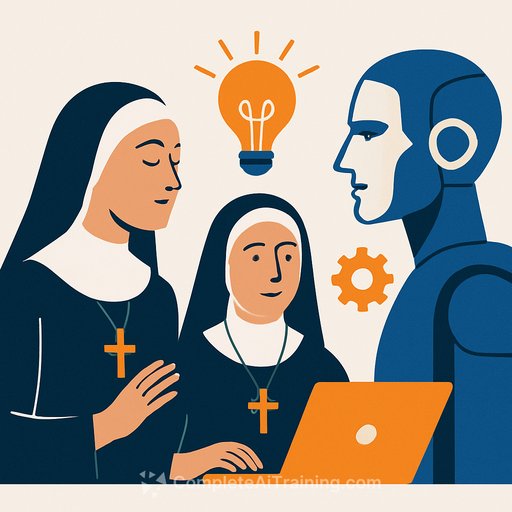Media Nuns Advocate for Mindful AI Use: “Humans Create, Machines Generate”
Artificial intelligence (AI) is changing how we consume and create media. Amid this shift, a group known as the “media nuns” is urging us to stay thoughtful about AI’s role, emphasizing a key distinction: “human beings create, machines generate.”
Sister Nancy Usselmann, director of the Daughters of St. Paul’s Pauline Media Studies, highlights that AI sparks many questions and concerns but also excitement. The Daughters of St. Paul, called “media nuns” due to their focus on media outreach, study emerging trends and help people—including parents and young adults—understand what these changes mean for daily life.
Balancing AI Excitement with Reflection
Usselmann advises caution amid the rush to adopt new AI tools. “We need to take a step back,” she says, referencing the Church’s guidance in the document Antiqua et Nova. The goal isn’t to label AI as good or bad but to understand what it really is: “machine learning trained to mimic aspects of human intelligence.”
AI offers useful tools across sectors like medicine and finance by processing vast data quickly. But it also raises concerns around job loss, privacy, accountability, and misuse. Particularly worrying is how young people may turn to AI chatbots for friendship or therapy.
- Ask if the AI app supports the common good.
- Consider whether it respects human dignity.
Using AI for Evangelization and Faith
The Church doesn’t forbid AI but encourages presence within digital culture to guide and transform it positively. Catholic innovators are developing AI tools aligned with the Church’s mission, such as Longbeard, Magisterium AI, and Truthly. These offer liturgical resources and daily Mass readings, often sourcing content from Rome’s pontifical universities.
Some AI apps like the Grace app provide personalized spiritual guidance, supplementing—not replacing—traditional faith practices. These tools can assist people’s faith journeys while encouraging critical thinking about AI’s role. The key is using AI to support, not diminish, human reasoning and dignity.
Humans Create, Machines Generate
AI can generate content based on existing data, but it lacks the soul and moral agency that human creativity requires. “Human beings create, machines generate,” Usselmann stresses. Creativity flows from our unique nature as beings made in God’s image, enabling deep reflection, self-expression, and moral decision-making.
While AI might produce art or beauty, true creative depth comes from human experience and divine inspiration.
Continuing the Conversation on AI and Faith
Usselmann plans to deepen her AI knowledge at the Builders AI Forum at the Pontifical Gregorian University in Rome. This forum gathers Catholic AI innovators, investors, theologians, and educators to discuss how AI can align with Christian anthropology and serve the Church’s mission.
For those in PR and communications, this dialogue underlines the importance of thoughtful AI use in media and messaging. Understanding AI’s potential and limitations helps maintain ethical standards and respect for human dignity within digital narratives.
To explore practical AI skills that can support your work, consider checking out Complete AI Training’s latest courses. They offer focused learning paths to navigate AI tools effectively while staying grounded in ethical use.
Your membership also unlocks:






